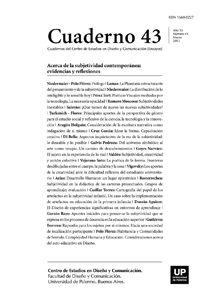La poética de la forma. Fronteras desdibujadas entre el cuerpo, la palabra y la cosa
Abstract
A sort of survival lies in the tireless human task of representing space, time and reality itself, although the latter lacks edges. In this text, we will consider that a poet is the creator of things and words, the designer of experiences whom with its body inhabits other bodies through formal and symbolic metaphors. Encompass the boundless or represent the unrepresentable, has been the constant struggle of this discourse maker: truth is a mirror box, the sign becomes artifice, machination of a body enraptured by the sensations. The art of the poets of the thing and the word is to appoint, to shape, to score without sacrificing the sense, but leaving the door open to continue playing with reality. The metaphor embodied in the body, the object and word, engendered new realities, because the signs of wealth and its
combinations open to allow the expression, experimentation and speculation ... “The fixity is always momentary”, Octavio Paz say.
References
Bachelard, G. (1982). La poética de la ensoñación. México: Fondo de Cultura Económica.
de Certeau, M. (1996). La invención de lo cotidiano 1. Artes de hacer. México: Universidad Iberoamericana - Instituto tecnológico de estudios superiores de occidente.
Derrida, J. (1997). El Monolinguismo del Otro o la Prótesis del Origen. Buenos Aires: Manantial.
Fiske, J. (1984). Introducción al estudio de la comunicación. Bogotá: Norma.
Nietzsche, F. W. (2010). Sobre verdad y mentira en sentido extramoral y otros fragmentos de
filosofía del conocimiento. Madrid: Editorial Tecnos.
Ricoeur, P. (2002). La Metáfora Viva. Barcelona: Trotta.
Paz, Octavio. Águila o Sol (2001). México: Fondo de Cultura Económica.
(1974). El Mono Gramático. Barcelona: Seix Barral.
(1972). Trabajos del poeta, en La centena. Barcelona: Seix Barral.
Vico, G. (2006). Principios de una ciencia nueva en torno a la naturaleza común de las naciones.
México: Fondo de Cultura Económica.
Voloshinov, V. N. - Bajtin, M. (1992). Marxismo y filosofía del lenguaje. Madrid: Alianza.
Los autores/as que publiquen en esta revista ceden los derechos de autor y de publicación a "Cuadernos del Centro de Estudios de Diseño y Comunicación", Aceptando el registro de su trabajo bajo una licencia de atribución de Creative Commons, que permite a terceros utilizar lo publicado siempre que de el crédito pertinente a los autores y a esta revista.


